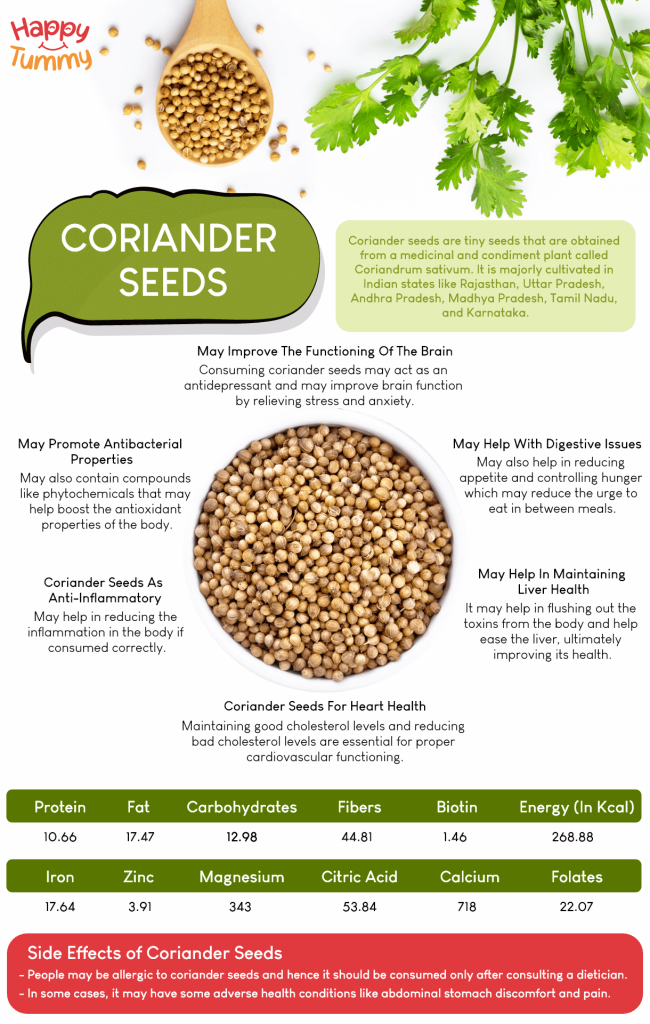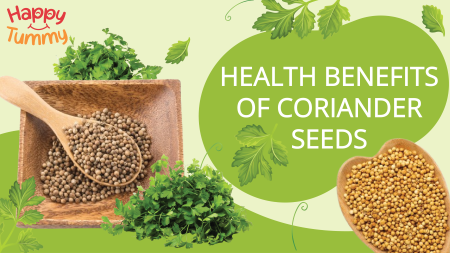Table of Contents
Coriander seeds, an essential component in almost every Indian household, have numerous benefits for health. These small seeds used in Indian curry and other dishes have the potential to improve overall health due to their composition and nutritional profile.
The small addition of these seeds which are easily accessible in India and are pocket-friendly, may cause a major difference in health.
Read further to get a detailed insight into the health benefits of coriander seeds.
What are Coriander seeds?
Coriander seeds are tiny seeds that are obtained from a medicinal and condiment plant called Coriandrum sativum. It is majorly cultivated in Indian states like Rajasthan, Uttar Pradesh, Andhra Pradesh, Madhya Pradesh, Tamil Nadu, and Karnataka.
Dhaniya ke Beej may be used in culinary dishes to enhance the flavour as a whole or in the form of powder. It has numerous health benefits as well. They are used as medicinal herbs, in cosmetics, aromatherapy, or even in fertilizers. [1]
Other Names of Coriander Seeds
The scientific name of coriander seeds is Coriandrum sativum. It is known by different names in different regions across India. The table below gives an insight into the regional names of coriander seeds.
| Hindi | Dhaniya ke Beej | धनिया के बीज |
| Tamil | Kothamalli Vithaigal | கொத்தமல்லி விதைகள் |
| Telugu | Dhaniyalu | ధనియాలు |
| Assamese | Dhoniya Bichi | ধনিয়া বীচি |
| Bengali | Dhoniya Beej | ধনিয়া বীজ |
| Malayalam | Malli | മല്ലി |
| Kannada | Kothambari Beejagalu | ಕೊತ್ತಂಬರಿ ಬೀಜಗಳು |
| Marathi | Dhane | धणे |
| Punjabi | Dhaniya di Beej | ਧਨੀਆ ਦੀ ਬੀਜ |
Nutritional Profile of Coriander Seeds
The nutritional profile of coriander seeds is given below – [10]
| Nutrients | Per 100 gm |
| Protein | 10.66 |
| Fat | 17.47 |
| Carbohydrates | 12.98 |
| Fibers | 44.81 |
| Biotin | 1.46 |
| Energy (in kcal) | 268.88 |
| Iron | 17.64 |
| Magnesium | 343 |
| Citric Acid | 53.84 |
| Calcium | 718 |
| Zinc | 3.91 |
| Oxalate | 809 |
| Folates | 22.07 |
Health Benefits of Coriander Seeds

1. May Improve the Functioning of the Brain
Oxidative stress and anxiety may hinder the brain’s functioning. Consuming coriander seeds may act as an antidepressant and may improve brain function by relieving stress and anxiety.
It may also act as a protector of brain cells due to its neuroprotective properties that may prevent severe diseases like Alzheimer’s and nerve damage.
Taking a balanced diet along with condiments like coriander seeds may increase cognitive function. Due to better functioning of brain nerves, it may also enhance the memory and learning capacity. [2]
2. Coriander Seeds for Heart Health
Coriander seeds may help maintain heart health due to their high fibre content that helps lower the level of Low-Density Lipoprotein. Maintaining good cholesterol levels and reducing bad cholesterol levels are essential for proper cardiovascular functioning.
Consuming Dhaniya ke Beej might help maintain the blood pressure as well. [3]
The calcium content of these seeds is 718mg per 100 gm which is very beneficial in maintaining the stabilized rhythm of the heart.
3. May Help with Digestive Issues
Including coriander seeds in the diet may increase the metabolism and an increased metabolism may lead to weight loss helping in achieving the desired weight goal. Dhaniya ke Beej may also help in the cases of hyperacidity and bloating. A natural cleansing drink “dhanyak hima” – coriander seeds infusion may also improve the digestive process.
Coriander seeds may also help in reducing appetite and controlling hunger which may reduce the urge to eat in between meals. It will control the calorie intake and may help in managing the weight. [4]
My Meal Plan by Aashirvaad may help you in getting a detailed and customized diet plan that will not only help in weight loss but also give insights into the macro and micronutrients.
4. May Promote Antibacterial Properties
Antibacterial properties in coriander seeds may help in fighting against bacterial infections and viruses. Dhaniya ke Beej also contain compounds like phytochemicals like flavonoids and phenolics that may help boost the antioxidant properties of the body. [5]
This medicinal herb may also help develop the natural antifungal properties of the body. Since ancient times it has been used in traditional medicine and improve the defence mechanism of the body.
You can clarify your doubts by consulting an expert at Ask an Expert by Aashirvaad and get answers to your queries and problems.
5. May Help in Maintaining Liver Health
Detoxification of the body in very essential for maintaining liver health and consuming Dhaniya ke seeds may assist in it. It may help in flushing out the toxins from the body and help ease the liver, ultimately improving its health.
A good digestive system is equally important for improving the functioning and health of the liver. The antioxidant properties of these seeds may protect against germs and help in liver regeneration. [6]
You can take a quick test at Digestive Quotient by Aashirvaad and know your digestive health better. Also, you can get a Dietician Consultation and improve your overall diet and lifestyle with expert insights.
6. Coriander Seeds as Anti-inflammatory
Coriander seeds may also exhibit anti-inflammatory properties that may help in reducing the inflammation in the body if consumed correctly.
The antibacterial properties may help in fighting the cause of inflammation and improve overall health.
It contains pro-inflammatory molecules like interleukins and cytokines that may even help in providing relief from the pain of Arthritis by easing the stiffness and swelling. [7]
However, it is advised to consult a dietician before making any major change in your diet plan.
Tips for Storing Coriander Seeds
Storing Dhaniya ke Beej in a certain way may help increase the shelf life of the food item and also help maintain its flavour profile. [8]
- Storing coriander seeds in an glass container reduces spoilage and oxidation, helping retain the flavour profile.
- Keeping the seeds away from moisture prevents the growth of fungus and helps maintain the quality of the seeds.
- For long-term preservation of seeds, it is advised to store them in the refrigerator by properly sealing them in zip-lock bags.
- It is important to store this seed in a cool and dark place rather than in a humid climate
Ways to Consume Coriander Seeds
Coriander seeds can be consumed in several different ways according to the needs and preferences of an individual. [9]
- Overnight Cold Infusion – Dhaniya ke Beej may be used in the form of tea by infusing it in the water which may help in curbing hunger.
- In the form oDhaniya ke Beej.
- In the roasted form – Dhaniya ke Beej may be used by simply dry roasting and adding them to dishes as needed to enhance the taste.
- By tempering – It may be used by tempering it by directly adding it to hot oil and extracting the flavour out of it.
Recipes with Coriander Seeds
Recipe 1: Coriander Seeds Pesto
Ingredients
- Coriander seeds – 2 tbsp
- Butter/oil
- Coriander leaves – 1 bundle
- Chopped walnuts – 2 tbsp
- Salt to taste
- Pepper powder – 1 tsp
- Peeled garlic clove – 4-5
Method
- Dry roast coriander seeds and walnuts separately.
- Take a grinder jar, add all the ingredients in it i.e. coriander seeds, walnuts, cheese, garlic cloves, and coriander, and blend it into a thick paste.
- Add butter/oil to it and season it with salt and pepper.
- Use it fresh or store it in a container and keep it in the refrigerator.
Recipe 2: Coriander Flavoured Chickpeas
Ingredients
- Chickpeas – 1 cup
- Dry roasted coriander seeds – 1 tbsp
- Chilli flakes
- Salt to taste
- Black pepper
- Oil
Method
- Grind the roasted Dhaniya ke Beej into fine powder.
- Take a bowl, add chickpeas, and season it with coriander powder, chili flakes, salt, and pepper.
- Roast it in the oven after drizzling some oil on them.
- Enjoy the crunchy coriander flavoured chickpeas.
Recipe 3: Coriander Dry Fruit Bowl
Ingredients
- Chopped almonds – 2 tbsp
- Chopped walnuts – 2 tbsp
- Pistachios – 1 tbsp
- Honey
- Coriander powder
Method
- Dry roast all the dry fruits separately.
- In a bowl, add these roasted dry fruits, give them a good mix, drizzle honey on them, and sprinkle some coriander powder.
- Enjoy the healthy and tasty snack – a dry fruit bowl.
Side Effects of Coriander Seeds
People may be allergic to Dhaniya ke Beej and hence it should be consumed only after consulting a dietician.
In some cases, it may have some adverse health conditions like abdominal stomach discomfort and pain.
Final Words
Dhaniya ke Beej are a great flavour booster in most dishes and also have a lot of health benefits. It can be used in different forms like powder, or tea.
It may provide several health benefits and the addition of these in the overall diet may improve the total nutritional value of the food.
Some recipes that are not so commonly used are also included to help you experiment with your food and consume it as it suits your taste preference. However, it may have some side effects for some people and hence it is advised to consult a dietician for more insights.
FAQs
Dhaniya ke Beej along with a balanced diet may have several health benefits that include improving brain health, maintaining liver health, reducing inflammation, helping in weight loss, exhibiting antibacterial properties, improving heart health, and many more. Consuming Dhaniya ke Beej in the desired amount regularly may help in improving overall health and lifestyle.
Coriander seeds may help in weight loss along with reducing overall calorie intake. It may help in improving the metabolic rate which will help in weight loss. In boiling water add coriander seeds and let them infuse for a few minutes, then strain it in a cup and add honey. Consuming it warm early in the morning on an empty stomach may promote weight loss. However, solely depending on Dhaniya ke Beej for weight loss may not give the desired result as a balanced diet is required along with some exercise.
Coriander seeds may be consumed daily as they have several health benefits but in moderation. Except for those allergic to it, others may include Dhaniya ke Beej in their diet as it may help in improving gut health, better digestion, bone health, and many more. However, moderation is the key. It is important to consume such seeds in limited quantity and avoid over-consumption.















